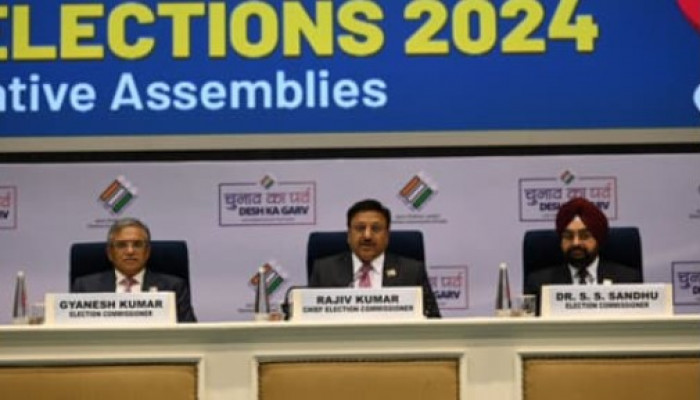Lok Sabha elections scheduled in 7 phases, polling begins April 19 and results expected on June 4
- In Reports
- 05:33 PM, Mar 16, 2024
- Myind Staff
The Election Commission of India has announced that the Lok Sabha elections in India, described as the world’s largest democratic exercise, will be conducted in seven phases spanning from April 19 to June 1.
Additionally, voting for the Andhra Pradesh, Sikkim, Arunachal Pradesh, and Odisha assemblies will occur on April 19 and May 13. The results of these elections are scheduled to be declared on June 4.
Chief Election Commissioner Rajiv Kumar expressed confidence in conducting memorable, independent, and impartial polls after assessing all states. He made these remarks during a press briefing livestreamed on ECI social media platforms. Kumar stated that the commission was determined to address issues such as the use of muscle, money, misinformation, and violations of the poll code.
Prime Minister Narendra Modi stated that the BJP and NDA were fully prepared for the elections, emphasising their track record of good governance and service delivery. He criticised the Opposition for lacking direction and substantial issues, accusing them of resorting to abusive language and vote bank politics. Modi highlighted their dynastic approach, divisive tactics, and corruption record, stating that such leadership was undesirable to the people.
The 18th Lok Sabha must be formed before June 16, coinciding with the expiration of the current House's term. Similarly, the terms of the assemblies in Andhra Pradesh, Sikkim, Arunachal Pradesh, and Odisha are set to conclude in June as well.
In 2019, the BJP regained power with an expanded majority, securing 303 seats out of the 543-member Lok Sabha, while the Congress managed to secure 52 seats. The BJP has set ambitious targets of achieving 370 seats individually and 400 seats for the NDA coalition it spearheads, focusing on welfare policies, developmental initiatives, and the Hindutva ideology.
If re-elected, Modi would become India’s first head of government since Jawaharlal Nehru to secure three consecutive terms. Modi solicited suggestions from the public to shape his agenda for a "developed India" under the banner of "Viksit Bharat".
Former allies have rejoined the NDA before the polls, as the BJP aims to fortify its position in northern India and expand its presence in eastern and southern regions. The Opposition's INDIA alliance seeks to challenge the BJP's electoral dominance and diverse social coalition.
The schedule was announced two days after retired bureaucrats Gyanesh Kumar and Sukhbir Singh Sandhu were appointed as election commissioners by the President. The Prime Minister-led selection committee made the appointments under a new law, a day before the Supreme Court declined to stay the appointments and agreed to hear the challenge to the legislation.
In 2019, the Lok Sabha poll schedule was announced on March 10, with polling conducted in seven phases from April 11 to May 23. The voter turnout of 67% marked the highest since India's first election in 1951-52, which saw a turnout of only 45% due to logistical challenges in reaching remote and illiterate voters.
In 2019, women's turnout surpassed men's for the first time, with nearly 970 million eligible voters expected for the 2024 Lok Sabha polls, almost four times the US voter population. Around 26.3 million new electors were added, including 14.1 million new women voters. Additionally, over 20 million young voters were added, along with 18.5 million voters over 80 and 238,000 centenarians.
Image source: Hindustan Times







Comments